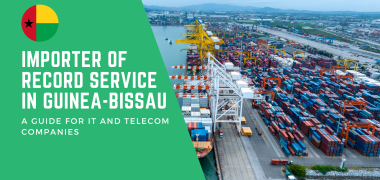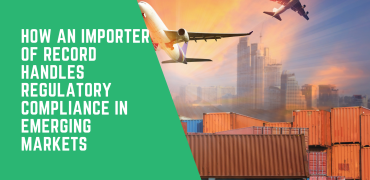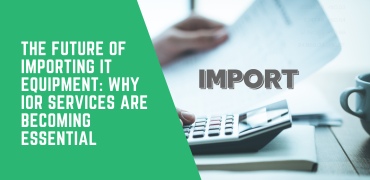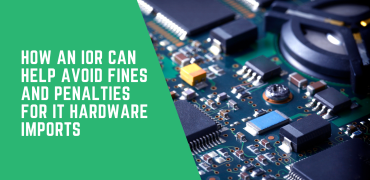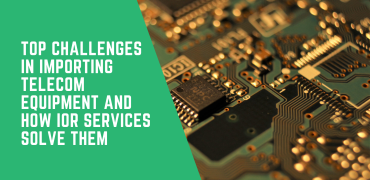The global expansion of IT and telecom companies necessitates a deep understanding of the import regulations and processes in various countries. Ivory Coast, also known as Côte d’Ivoire, is an emerging market with significant potential for IT and telecom investments. However, importing IT and telecom equipment into Ivory Coast can be challenging due to the complex regulatory environment. This guide aims to provide a comprehensive overview of the Importer of Record (IOR) service, the import duties and taxes on IT and telecom equipment, and the special permits and approvals required to successfully navigate the import process in Ivory Coast.
Understanding the Importer of Record (IOR) Service
The Importer of Record (IOR) service is crucial for companies that do not have a registered entity in a foreign country but need to import goods. An IOR acts as the official entity responsible for ensuring compliance with local import regulations. This includes managing documentation, paying necessary duties and taxes, and ensuring the equipment meets local standards.
Benefits of Using an IOR Service
- Regulatory Compliance: The IOR ensures that all imports comply with Ivory Coast’s local laws and regulations, reducing the risk of legal issues and delays.
- Cost-Effective: For companies not planning to establish a local entity, using an IOR is more cost-effective.
- Simplified Process: The IOR handles all aspects of the import process, including documentation, customs clearance, and logistics.
- Local Expertise: IOR providers possess extensive knowledge of local regulations and customs procedures, facilitating a smoother import process.
Import Duties and Taxes on IT and Telecom Equipment in Ivory Coast
Understanding the import duties and taxes is crucial for budgeting and pricing strategies. Ivory Coast imposes several charges on imported goods, including IT and telecom equipment.
Import Duties
Import duties in Ivory Coast are based on the Harmonized System (HS) code, which classifies traded products.
- Duty Rates: The duty rates for IT and telecom equipment range from 5% to 20%, depending on the specific type of equipment. For example, networking devices may attract different rates compared to computer hardware.
- Customs Valuation: Duties are calculated on the customs value of goods, which includes the cost, insurance, and freight (CIF).
Value Added Tax (VAT)
Ivory Coast imposes a Value Added Tax (VAT) on imported goods. The standard VAT rate is 18%, applied to the CIF value plus import duties.
Other Taxes and Fees
- Statistical Fee: A statistical fee of 1% is levied on the CIF value of imported goods.
- Community Solidarity Levy (PCS): This levy is typically 1% of the CIF value and is applicable to imports from non-ECOWAS (Economic Community of West African States) countries.
- Customs Processing Fees: Additional fees may apply for customs processing and administrative services.
Special Permits and Approvals Required
Importing IT and telecom equipment into Ivory Coast requires obtaining specific permits and approvals from various government agencies to ensure compliance with local regulations.
Telecommunications Regulatory Authority of Ivory Coast (ARTCI)
The Telecommunications Regulatory Authority of Ivory Coast (ARTCI) oversees the telecommunications sector. Importers must obtain approval from ARTCI for the importation of telecom equipment.
- Type Approval Certificate: ARTCI requires a Type Approval Certificate to ensure that telecom equipment complies with national standards and does not interfere with local networks. This involves testing and verifying the equipment’s technical specifications.
- Import License: An import license from ARTCI is necessary for certain telecom equipment to ensure it is suitable for the local telecommunications infrastructure.
Ministry of Commerce and Industry
The Ministry of Commerce and Industry plays a significant role in regulating imports into Ivory Coast.
- Import Declaration: Importers must file an import declaration with the Ministry of Commerce and Industry, detailing the imported goods’ value, quantity, and HS code.
- Commercial Invoice and Packing List: These documents must accompany the import declaration and provide detailed information about the shipment.
Customs Authority
The Customs Authority in Ivory Coast enforces customs regulations and collects duties and taxes on imported goods.
- Customs Clearance: Importers must submit all relevant documentation to the Customs Authority for clearance. This includes the import declaration, commercial invoice, packing list, and any required permits or licenses.
- Inspection and Verification: Customs officials may conduct inspections and verifications to ensure that the imported goods match the declared information and comply with local regulations.
Steps to Import IT and Telecom Equipment into Ivory Coast
Successfully importing IT and telecom equipment into Ivory Coast involves several steps, requiring meticulous attention to detail and compliance with local regulations.
Step 1: Engage an IOR Service Provider
The first step is to engage a reputable IOR service provider. The IOR will handle the import process, ensuring compliance with all legal requirements.
Step 2: Obtain Necessary Permits and Approvals
Work with the IOR to obtain the necessary permits and approvals from ARTCI and the Ministry of Commerce and Industry. This includes obtaining a Type Approval Certificate, import license, and filing an import declaration.
Step 3: Prepare Documentation
Ensure that all required documentation, such as the commercial invoice, packing list, and import declaration, is accurately prepared and submitted.
Step 4: Customs Clearance
Submit the documentation to the Customs Authority for clearance. The IOR will manage this process, including any inspections or verifications required by customs officials.
Step 5: Pay Duties and Taxes
Pay the applicable import duties, VAT, statistical fee, and any other taxes or fees. The IOR will handle these payments and provide proof of payment to the Customs Authority.
Step 6: Delivery and Distribution
Once the goods are cleared by customs, arrange for delivery to the final destination. The IOR can assist with logistics and transportation to ensure that the equipment reaches its intended location.
Challenges and Considerations
Regulatory Changes
Ivory Coast’s regulatory environment is subject to change. It is essential to stay updated on any changes that may affect the import process. Regular communication with local authorities and regulatory bodies is advisable.
Quality Control and Compliance
Ensuring that imported equipment meets local standards and quality control measures is critical. Non-compliance can result in delays, fines, or rejection of goods at the border. Partnering with an experienced IOR who understands these requirements is beneficial.
Logistics and Infrastructure
Ivory Coast’s logistics and infrastructure can pose challenges, particularly in terms of transportation and warehousing. Working with local partners who have experience in managing these challenges can help ensure smooth operations.
Language and Cultural Barriers
French is the official language of Ivory Coast, and understanding the local language and cultural nuances is important for effective communication and negotiation. Engaging local experts or bilingual staff can facilitate smoother interactions.
Conclusion
Importing IT and telecom equipment into Ivory Coast requires careful planning and a thorough understanding of the local regulatory environment. Utilizing an Importer of Record service can simplify the process, ensuring compliance with all legal requirements and minimizing delays. Understanding the import duties, taxes, and required permits is crucial for successful importation.
By following the steps outlined in this guide and staying informed about regulatory changes, IT and telecom companies can effectively navigate the import process and capitalize on the opportunities in Ivory Coast’s growing market. Engaging with local experts and maintaining open communication with regulatory authorities will further enhance the efficiency and success of importing IT and telecom equipment into Ivory Coast.
